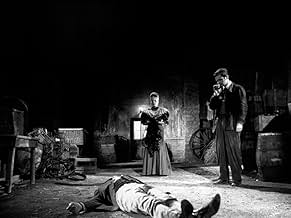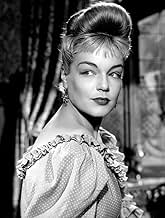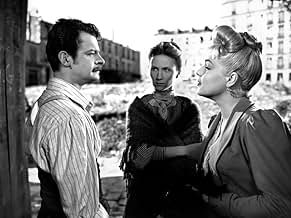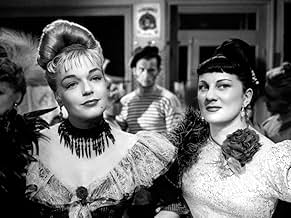IMDb RATING
7.6/10
6.5K
YOUR RATING
Three gangsters and an ex-con carpenter all fall for the same beautiful golden-haired woman in Belle Époque France.Three gangsters and an ex-con carpenter all fall for the same beautiful golden-haired woman in Belle Époque France.Three gangsters and an ex-con carpenter all fall for the same beautiful golden-haired woman in Belle Époque France.
- Won 1 BAFTA Award
- 2 wins & 2 nominations total
Solange Certain
- L'amie de Paulo
- (as Solange Certin)
Émile Genevois
- Billy - membre de la bande
- (as Emile Genevois)
Featured reviews
Casque d'or is one of the greatest films about passion I have ever seen. The intensity of the feeling between Simone Signoret and Serge Reggiani, particularly the former, is overwhelming. These people are outsiders from the very beginning, being part of the criminal underworld from which they will never escape. The honest, bourgeois world is permanently closed to them. Children in French secondary school write essays about this film as if it were a classic French novel. It certainly is a classic, and it could not have been made in any country other than France.
Simone Signoret plays a beautiful woman of ill repute who is at the center of several men's affections - her hotheaded gangster boyfriend, an ex-criminal who's turned over a new leaf, and the leader of the gang himself. It's a pretty simple story but very well told by Jacques Becker, with the scenes involving a double cross and its brilliant ending standing out. The cinematography is wonderful, including an outdoor dance evoking the paintings of Renoir, a beautiful walk along the riverside, and the claustrophobic cells inside a police van. Signoret is radiant, defiant even as she's slapped around and with an air of sweet happiness when she's able to get away from it all, and Serge Reggiani is strong as well. Really just a solid film, one that expresses the spirit of France in the 1950's via its filmmaking, and a small window into the Belle Époque as well.
After being released from prison where he served five years for an undisclosed crime, Georges Manda (Serge Reggiani), a soft-looking, taciturn man with a handlebar moustache, becomes a hard working carpenter, determined to go straight. When Raymond (Raymond Bussieres), a fellow gang member with whom he served time in prison, introduces him to Marie (Simone Signoret) at a dance, however, the solid foundation he was trying to build begins to come unglued. Signoret, one of the classiest and most elegant actresses, is strikingly irresistible as the moll of a suave gang leader in Jacques Becker's 1952 masterpiece Casque D'or. Considered a failure when it first opened but, after receiving critical acclaim in New York, the film developed a wider audience in France and has now become a classic, newly restored on a Criterion DVD.
Set in Paris in the 1890s and based on actual police accounts, Casque D'or is not an arid period piece or costume drama, but a rich, vibrant, and lovingly evocative work that successfully recreates the ambiance of Paris at the turn of the century. Unlike Melville's Le Samourai which was filmed in near darkness to capture the sullen milieu of the underworld, Becker bathes his film in a dazzling poetic light that belies the darkness of its theme and some scenes have been compared to an impressionist painting. Marie is being "kept" by Roland (William Sabatier), a volatile and jealous dandy and is also sought after by the crime boss Felix Leca (Claude Dauphin). Manda and Marie fall in love but soon Manda runs afoul of the law after killing the jealous Roland in a fight. Leca seizes on this opportunity to remove Manda from the picture by framing his closest friend but doesn't count on Manda's dedication to doing what is right.
Despite being about the criminal element, there is little violence in Casque D'or and it is more of an moody romance than a crime drama, perhaps accounting for its initial failure at the box office. The most brilliantly realized sequence takes place at a countryside retreat where Manda and Marie go for a few hours of happiness together before the inevitable denouement. Casque D'or is a film about friendship, loyalty, and, most of all, about passion and its consequences. When Marie hears wedding bells and drags Manda into a church, all he can say is "not now", but his expression suggests that he knows that their love will be a dream that fades into dawn.
Set in Paris in the 1890s and based on actual police accounts, Casque D'or is not an arid period piece or costume drama, but a rich, vibrant, and lovingly evocative work that successfully recreates the ambiance of Paris at the turn of the century. Unlike Melville's Le Samourai which was filmed in near darkness to capture the sullen milieu of the underworld, Becker bathes his film in a dazzling poetic light that belies the darkness of its theme and some scenes have been compared to an impressionist painting. Marie is being "kept" by Roland (William Sabatier), a volatile and jealous dandy and is also sought after by the crime boss Felix Leca (Claude Dauphin). Manda and Marie fall in love but soon Manda runs afoul of the law after killing the jealous Roland in a fight. Leca seizes on this opportunity to remove Manda from the picture by framing his closest friend but doesn't count on Manda's dedication to doing what is right.
Despite being about the criminal element, there is little violence in Casque D'or and it is more of an moody romance than a crime drama, perhaps accounting for its initial failure at the box office. The most brilliantly realized sequence takes place at a countryside retreat where Manda and Marie go for a few hours of happiness together before the inevitable denouement. Casque D'or is a film about friendship, loyalty, and, most of all, about passion and its consequences. When Marie hears wedding bells and drags Manda into a church, all he can say is "not now", but his expression suggests that he knows that their love will be a dream that fades into dawn.
10pzanardo
Jacques Becker was an artist and a director. His legacy is a trilogy of masterpieces: "Casque d'Or", "Touchez pas au Grisbi", "Le Trou", three luminous instances of cinema as art.
The linear story of "Casque d'Or" has the neatness of a Maupassant's tale. We are transferred into a most glorious epoch for French culture and art: the decline of the 19th century, the age of Impressionism. Marie (Simone Signoret) is a blond beauty, a cheerful "lost woman". She's the girl-friend of a member of a gang of small-time but ruthless criminals. She falls in first-sight-love with George Manda (Serge Reggiani) a former crook, now a honest carpenter. Predictable troubles ensue...
The atmosphere of the epoch is wonderfully recreated, with a black-and-white photography of indescribable beauty. An Impressionist Master behind the camera couldn't have done better. And, in fact, Becker was a favorite "student" of director Jean Renoir, Auguste Renoir's son. Becker's characteristic narrating style is nostalgic, serene, gently ironic. He deliberately avoids over-dark tones in his representation of the underworld, even in the middle of tragic events.
Simone Signoret is a charismatic presence on the screen: outstanding is her use of body-language to draw Marie's character, both a romantic enamoured woman and a cynical harlot. Reggiani is excellent as the laconic, tough Manda: he utters some twenty words along the whole movie, yet we perfectly understand his peculiar honor code, his profound love for Marie, his unselfish devotion to friendship. Splendid is Leca (Claude Dauphin), the boss of the gang, officially a respectable well-off wine-dealer: proficient, cool-headed, extremely cunning and Machiavellian, always ready to betray his own men to pursue his dirty purposes. Indeed, great care is paid to the design of all characters, with superb acting by the whole cast.
Exquisite poetic touches permeate the movie... Marie drags Manda into a church, where a simple wedding (of unknown middle-class people) is taking place. Shortly after, Manda is impatient "Let's go"; and Marie "No, just another minute"... and she contemplates the wedding with a dreaming smile...
"Casque d'Or": a perfect work of art.
The linear story of "Casque d'Or" has the neatness of a Maupassant's tale. We are transferred into a most glorious epoch for French culture and art: the decline of the 19th century, the age of Impressionism. Marie (Simone Signoret) is a blond beauty, a cheerful "lost woman". She's the girl-friend of a member of a gang of small-time but ruthless criminals. She falls in first-sight-love with George Manda (Serge Reggiani) a former crook, now a honest carpenter. Predictable troubles ensue...
The atmosphere of the epoch is wonderfully recreated, with a black-and-white photography of indescribable beauty. An Impressionist Master behind the camera couldn't have done better. And, in fact, Becker was a favorite "student" of director Jean Renoir, Auguste Renoir's son. Becker's characteristic narrating style is nostalgic, serene, gently ironic. He deliberately avoids over-dark tones in his representation of the underworld, even in the middle of tragic events.
Simone Signoret is a charismatic presence on the screen: outstanding is her use of body-language to draw Marie's character, both a romantic enamoured woman and a cynical harlot. Reggiani is excellent as the laconic, tough Manda: he utters some twenty words along the whole movie, yet we perfectly understand his peculiar honor code, his profound love for Marie, his unselfish devotion to friendship. Splendid is Leca (Claude Dauphin), the boss of the gang, officially a respectable well-off wine-dealer: proficient, cool-headed, extremely cunning and Machiavellian, always ready to betray his own men to pursue his dirty purposes. Indeed, great care is paid to the design of all characters, with superb acting by the whole cast.
Exquisite poetic touches permeate the movie... Marie drags Manda into a church, where a simple wedding (of unknown middle-class people) is taking place. Shortly after, Manda is impatient "Let's go"; and Marie "No, just another minute"... and she contemplates the wedding with a dreaming smile...
"Casque d'Or": a perfect work of art.
Simone Signoret and Serge Reggiani star in "Casque d'Or," a 1952 film also starring Claude Dauphin and William Sabatier.
Signoret plays Marie, the kept woman of a good-looking gangster, Roland (Sabatier), but she is also desired by the gang's boss Felix Leca (Dauphin). One night she is introduced to Manda (Reggiani), a carpenter who, after a prison term, is trying to go straight. The two have an instant attraction, which angers the jealous Roland.
After a fight in which Roland is killed, Leca sees a way to get rid of Manda too. But Marie steps in, and the result is tragedy.
This is a beautifully photographed film that takes place in the 1890s, the Belle Epoque. Signoret is the center of a story about passion and love, as well as the lives of women back then at the hands of their keepers, and the brutality. Jacques Becker frames each scene magnificently.
Signoret wasn't in any way a typical star by Hollywood standards. She had a raw sexuality and sensuality, a voluptuous figure, and an earthy presence that gave her the edge over all of them. Each film she was in was elevated by her presence. You can well believe all three of the men in this film desired her.
Highly recommended.
Signoret plays Marie, the kept woman of a good-looking gangster, Roland (Sabatier), but she is also desired by the gang's boss Felix Leca (Dauphin). One night she is introduced to Manda (Reggiani), a carpenter who, after a prison term, is trying to go straight. The two have an instant attraction, which angers the jealous Roland.
After a fight in which Roland is killed, Leca sees a way to get rid of Manda too. But Marie steps in, and the result is tragedy.
This is a beautifully photographed film that takes place in the 1890s, the Belle Epoque. Signoret is the center of a story about passion and love, as well as the lives of women back then at the hands of their keepers, and the brutality. Jacques Becker frames each scene magnificently.
Signoret wasn't in any way a typical star by Hollywood standards. She had a raw sexuality and sensuality, a voluptuous figure, and an earthy presence that gave her the edge over all of them. Each film she was in was elevated by her presence. You can well believe all three of the men in this film desired her.
Highly recommended.
Did you know
- TriviaLiterary critics at the time were outraged by the fact that Jacques Becker chose to emphasize atmospherics at the expense of psychology. Nevertheless, Becker's approach had a profound effect on the young film-makers that would later go on to form the French New Wave, thereby changing French cinema forever.
- Quotes
[English subtitled version]
Old Woman Joinville Bar Patron: Charming! We can't go anywhere without meeting tarts.
- ConnectionsEdited into Apostrophes: Les plaisirs populaires (1989)
- SoundtracksSobre las Olas
(uncredited)
Music by Juventino Rosas
[The music to which Marie reluctantly dances with Roland at Joinville]
- How long is Casque d'Or?Powered by Alexa
Details
Box office
- Gross worldwide
- $1,413
- Runtime1 hour 39 minutes
- Color
- Aspect ratio
- 1.37 : 1
Contribute to this page
Suggest an edit or add missing content

















